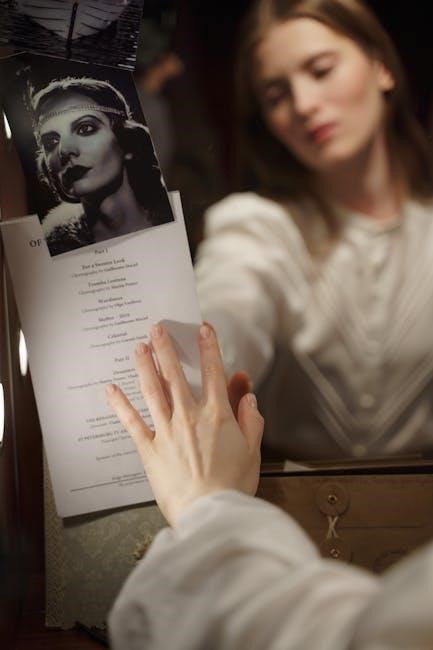Act 3 of Macbeth begins with a dramatic shift in power, as
Macbeth
solidifies his position as king, surrounded by his court and Lady Macbeth, now queen, in the royal palace․
Setting the Scene in the Royal Palace
The royal palace at Forres is the setting for the opening of Act 3, where Macbeth and Lady Macbeth are now established as king and queen․ The palace is filled with the trappings of power and wealth, and Macbeth is surrounded by his court․ The scene is one of grandeur and opulence, with Macbeth and Lady Macbeth playing the roles of monarchs․ The atmosphere is tense, however, as Macbeth is haunted by the prophecies of the weird sisters and the threat posed by Banquo and his sons․ The palace is also where Macbeth begins to plot against Banquo, setting in motion a chain of events that will lead to tragedy․ The scene is set for a dramatic and intense confrontation, as Macbeth’s desire for power and control consumed him․ The palace becomes a symbol of Macbeth’s newfound power․

Plot Development in Act 3
Macbeth’s actions become more ruthless and desperate to maintain power and control over Scotland slowly․
Macbeth’s Encounter with Banquo
Macbeth’s encounter with Banquo is a pivotal moment in Act 3, as it reveals the depth of Macbeth’s paranoia and guilt․ Macbeth is reminded of the witches’ prophecy that Banquo’s descendants will become kings, which fills him with anxiety and fear․ He invites Banquo to a feast, but beneath the surface, Macbeth is plotting against him; The encounter showcases Macbeth’s inability to shake off the feeling of unease and insecurity, despite his newfound power․ The conversation between Macbeth and Banquo is laced with tension, as Macbeth tries to gauge Banquo’s intentions and loyalty․ This encounter ultimately sets the stage for the tragic events that unfold, as Macbeth’s desire to eliminate Banquo becomes an all-consuming obsession․ The scene is a masterful portrayal of the destructive nature of ambition and the blurred lines between loyalty and deceit․

Analysis of Characters
Characters’ motivations and actions drive the plot, revealing complexities and nuances in their personalities and relationships slowly․
Macbeth’s Growing Paranoia and Ambition
Macbeth’s character undergoes significant development as his paranoia and ambition intensify, fueled by the witches’ prophecies and his own guilt, leading to a downward spiral of darkness and madness․ His fixation on Banquo and the perceived threat to his throne exemplifies this growing paranoia, prompting him to take drastic measures to eliminate potential threats․ The weight of his conscience and the pressure to maintain power drive Macbeth’s actions, revealing a complex and troubled individual․ As the story unfolds, Macbeth’s ambition becomes an all-consuming force, dictating his decisions and ultimately sealing his fate․ The exploration of Macbeth’s psyche offers a nuanced understanding of the human condition, highlighting the dangers of unchecked ambition and the devastating consequences of succumbing to darkness․ Macbeth’s transformation is a pivotal aspect of the play, driving the plot forward and shaping the characters’ interactions․
Themes in Act 3
Deception and ambition are dominant themes in Act 3, driving characters’ actions and decisions in the royal palace and beyond daily life situations always․
The Prophecies of the Weird Sisters and Their Impact
The prophecies of the weird sisters have a significant impact on the characters in Act 3, particularly Macbeth and Banquo․ The witches’ foretelling of Macbeth’s coronation and Banquo’s descendants’ future reign sparks a sense of ambition and unease in both characters․ Macbeth becomes increasingly paranoid, fearing that Banquo’s sons will overthrow him, while Banquo ponders the possibility of his own family’s rise to power․ The prophecies create a sense of tension and foreboding, driving the plot forward and influencing the characters’ actions․ The weird sisters’ words also raise questions about fate and free will, leaving the characters to wonder if their destinies are predetermined or if they have the power to shape their own futures․ This uncertainty adds to the overall sense of unease and suspense in Act 3․
Symbolism in Act 3
Darkness and light symbolize good and evil, guiding character actions and themes in Act 3 of Macbeth slowly unfolding with each scene and event․
The Significance of the coronation of Macbeth
The coronation of Macbeth is a pivotal event in Act 3, marking a significant shift in Macbeth’s character development and the play’s plot․
The ceremony itself is not depicted in the play, but its aftermath is, showing Macbeth’s newfound power and status․
As king, Macbeth is now responsible for making important decisions, and his actions have far-reaching consequences․
The coronation also serves as a reminder of the prophecies made by the weird sisters, which foretold Macbeth’s rise to power․
The event sets in motion a chain of events that will ultimately lead to Macbeth’s downfall, as he becomes increasingly consumed by guilt, paranoia, and ambition․
The coronation of Macbeth is a symbol of his newfound authority and the beginning of his reign as king, which will be marked by violence, bloodshed, and chaos․
This event is crucial to the play’s themes of power, ambition, and the consequences of one’s actions․

Conflict and Tension in Act 3
Macbeth’s inner turmoil and external threats create intense conflict and tension everywhere slowly․
The Murder of Banquo and Its Consequences
The murder of Banquo is a pivotal event in Act 3, as Macbeth’s hired assassins ambush and kill Banquo, but Fleance escapes․ This event has significant consequences, including Macbeth’s increased guilt and paranoia, as well as the fulfillment of the witches’ prophecy․ The murder also leads to a sense of unrest and disorder in Scotland, as Macbeth’s tyrannical rule becomes more apparent․ The consequences of Banquo’s murder are far-reaching, affecting not only Macbeth but also his relationships with others, including Lady Macbeth and the nobles․ The event marks a turning point in the play, as Macbeth’s descent into darkness and tyranny accelerates, leading to further violence and chaos․ The murder of Banquo is a crucial element in the play’s exploration of ambition, power, and the human condition․ Macbeth’s actions become more erratic and violent․

of Act 3
Macbeth’s darkness deepens, guilt consumes him, and chaos reigns in Scotland completely now․
Macbeth’s Downward Spiral into Darkness and Guilt
Macbeth’s actions lead to a downward spiral into darkness and guilt, as he becomes consumed by his own ambition and paranoia․
He is haunted by the ghost of Banquo, a constant reminder of his treachery, and his guilt begins to overwhelm him․
His relationship with Lady Macbeth also begins to deteriorate, as she too is haunted by the consequences of their actions․
The darkness and guilt that Macbeth feels are a result of his own actions, and he is unable to escape the consequences of his decisions․
As the act comes to a close, Macbeth is left to ponder the true cost of his ambition, and the darkness that has consumed him․
His downward spiral into darkness and guilt is a tragic consequence of his own actions, and sets the stage for the events of the final acts․
